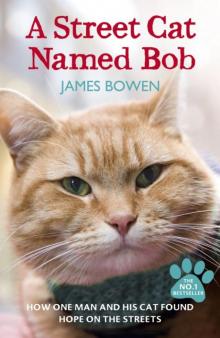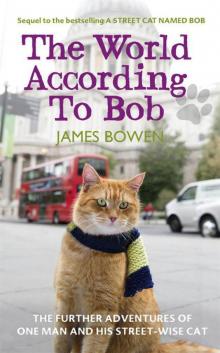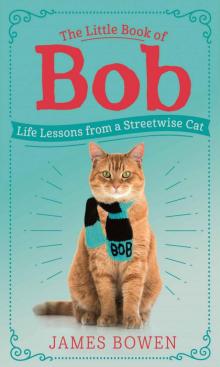- Home
- James Bowen
A Street Cat Named Bob Page 13
A Street Cat Named Bob Read online
Page 13
But then he was sick again, retching away and producing more bile. It was clearly more than motion sickness. Pretty soon he didn’t have anything left to bring up, which was puzzling because he’d eaten well the night before and at breakfast. That was when I realised there must be more to it than this. He must have been sick already today, even before we left the flats, probably when he’d been in the garden doing his business. He must have been feeling sick during the bus journey too, I could now see. I blamed myself for not spotting it sooner.
It’s weird how you react in a situation like that. I’m sure my instincts were the same as any parent or pet owner. All sorts of crazy, sometimes conflicting thoughts rushed through my mind. Had he simply eaten something that disagreed with him this morning? Had he swallowed something in the flat that had set him off? Or was this something more serious? Was he going to drop dead in front of me? I’d heard stories about cats collapsing in front of their owners after drinking cleaning fluids or choking on bits of plastic. For a split second, an image of Bob dying flashed through my head. I managed to pull myself together before my imagination ran riot.
Come on, James, let’s deal with this sensibly, I told myself.
I knew that all the retching and the fact that he no longer had any liquid to bring up meant that he was getting dehydrated. If I didn’t do anything he could do damage to one of his organs. I decided that some food and, more importantly, some water, would be a good idea. So I scraped him up and held him in my arms as we walked on to Covent Garden and a general store I knew nearby. I didn’t have much cash on me at all, but I cobbled together enough to buy a liquidised chicken meal that Bob usually loved and some good, mineral water. I didn’t want to risk giving him contaminated tap water. That might make matters even worse.
I carried him to Covent Garden and placed it down on the pavement near our normal pitch. I got out Bob’s bowl and spooned the chicken into it.
‘Here we go, mate,’ I said, stroking him as I placed the bowl in front of him.
Ordinarily he would have pounced immediately and guzzled down a bowl of food at a rate of knots, but not today. Instead he stood and looked at it for a while before he decided to tuck in. Even then he was very tentative about it, only picking at the bowl. He only ate the jelly. He didn’t touch a bit of the meat. Again, it set the alarm bells ringing. This wasn’t the Bob I knew and loved. Something was definitely wrong.
I half-heartedly set myself up to start selling the magazine. We needed some money to get us through the next few days, especially if I was going to have to take Bob to a vet and pay for some drugs. But my heart really wasn’t in it. I was far more concerned with watching Bob than trying to capture the attention of passers-by. He lay there, impassive, uninterested in anything. Unsurprisingly, not too many people stopped to make a donation. I cut the day short after less than two hours. Bob hadn’t been sick again, but he definitely wasn’t right. I had to get him home to the warmth – and dryness – of the flat.
I guess I’d been lucky with Bob until now. Ever since I’d taken him under my wing, he had been in perfect health, 100 per cent tip top. He’d had fleas early on but that was to be expected of a street cat. Since I’d treated him for that and given him an early worming treatment, he’d suffered no health problems at all.
Every now and again I had taken him to the Blue Cross van on Islington Green where he’d been microchipped. The vets and vet nurses there knew him well by now and always commented on what good condition he was in. So this was alien territory for me. I was terrified that it might be something serious. As he lay on my lap on the bus returning to Tottenham, I felt the emotions welling up every now and again. It was all I could do to stop myself from bursting into tears. Bob was the best thing in my life. The thought of losing him was terrifying. I couldn’t keep that thought out of my head.
When we got home Bob just headed straight for the radiator where he just curled up and went straight to sleep. He stayed there for hours. That night I didn’t sleep much, worrying about him. He’d been too out of it to even follow me to bed and was snoozing under the radiator in the front room. I kept hauling myself out of bed to check on him. I’d creep up in the gloom and listen for the sound of his breathing. One time I was convinced he wasn’t and had to kneel down to place my hand on his diaphragm to make sure it was moving. I couldn’t believe how relieved I was when I found he was purring gently.
Money was so tight I simply had to go out again the following day. That presented me with a real dilemma. Should I leave Bob in the flat on his own? Or should I wrap him up warm and take him into central London with me so that I could keep an eagle eye on him.
Luckily the weather was a lot better today. The sun had decided to make an appearance. And when I wandered out of the kitchen with my cereal bowl in my hands, I saw Bob looking up at me. He looked a little perkier today. And when I offered him a little food he nibbled at it a lot more enthusiastically.
I decided to take him with me. It was still early in the week, so I’d have to wait a few days before I could get him looked at by the Blue Cross van. So, in advance of that, I decided to do some research and headed for the local library where I logged on to a computer and started researching Bob’s symptoms.
I’d forgotten what a bad idea it is to search through medical websites. They always give you the worst possible scenario.
I punched in a few key words and came across a couple of informative-looking sites. When I entered the main symptoms - lethargic, vomiting, appetite loss and a few others - a whole swathe of possible illnesses popped up.
Some weren’t too bad, for instance, it could have been down to hairballs or maybe even a bad case of flatulence. But then I started looking at other possibilities. Just the As in the list were bad enough. They included Addison’s disease, acute kidney disease and arsenic poisoning. As if they weren’t scary enough, other options on the long list included feline leukaemia, colitis, diabetes, lead poisoning, salmonella and tonsillitis. Worst of all, as far as I was concerned, one of the sites said it could be an early sign of bowel cancer.
By the time I’d been reading for fifteen minutes or so I was a nervous wreck.
I decided to switch tack and look at the best treatments for vomiting. That was more positive. The sites I looked at suggested plenty of water, rest and supervision. So that was my plan for the next twenty-four to forty-eight hours. I’d basically keep an eye on him around the clock. If he started vomiting again, obviously, I’d head for the vets immediately. If not, I’d go to the Blue Cross on Thursday.
The next day I decided to stay at home until late in the afternoon to give Bob a good chance to rest. He slept like a log, curled up in his favourite spot. I wanted to keep an eye on him. He seemed OK, so I decided to leave him for three or four hours and try and squeeze in some selling. I didn’t have much option.
Trudging through the streets that led from Tottenham Court Road to Covent Garden I was aware of my invisibility again. When I got to Covent Garden all everyone could ask was ‘Where’s Bob?’ When I told people that he was ill they were all really concerned. ‘Is he going to be all right?’; ‘Is it serious?’; ‘Is he going to see a vet?’; ‘Is he OK on his own at home?’
It was then that an idea struck me. I had come across a vet nurse called Rosemary. Her boyfriend, Steve, worked at a comic-book shop near where we sometimes set up. Bob and I would pop in there every now and again and we had become friends. Rosemary had been in there with Steve one day and we’d struck up a conversation about Bob.
I decided to stick my head in there to see if either of them was around. Luckily Steve was there and gave me a phone number for Rosemary.
‘She won’t mind you ringing her,’ he said. ‘Especially as it’s about Bob. She loves Bob.’
When I spoke to Rosemary she asked me a load of questions.
‘What does he eat? Does he ever eat anything else when he’s out and about?’
‘Well, he rummages around in the bins,’ I said.
/> It was a habit he had never shaken off. He was an absolute terror. I’d seen him tear the garbage bags to pieces in the kitchen. I’d have to put them outside the front door. He was a street cat. You can take the cat off the street, but you can’t take the street out of the cat.
I could hear it in her voice, it was as if a light bulb had been switched on.
‘Hmmm,’ she said. ‘That might explain it.’
She prescribed some probiotic medication, some antibiotics and some special liquid to settle the stomach.
‘What’s your address?’ she said. ‘I’ll get it biked over to you.’
I was taken aback.
‘Oh, I’m not sure that I can afford that, Rosemary,’ I said.
‘No, don’t worry, it won’t cost you anything. I’ll just add it to another delivery in the area,’ she said. ‘This evening OK?’
‘Yes, great,’ I said.
I was overwhelmed. Such spontaneous acts of generosity hadn’t exactly been a part of my life in the past few years. Random acts of violence, yes; kindness, no. It was one of the biggest changes that Bob had brought with him. Thanks to him I’d rediscovered the good side of human nature. I had begun to place my trust - and faith - in people again.
Rosemary was as good as her word. I had no doubt she would be. The bike arrived early that evening and I administered the first doses of the medicine straight away.
Bob didn’t like the taste of the probiotic. He screwed his face up and recoiled half a step when I gave him his first spoonful of it.
‘Tough luck, mate,’ I said. ‘If you didn’t stick your face in rubbish bins, you wouldn’t have to take this stuff.’
The medicine had an almost immediate impact. That night he slept soundly and was a lot friskier the following morning. I had to hold his head in my hand to make sure he swallowed the probiotic.
By the Thursday he was well on the road to recovery. But, just as a precaution, I decided to pop along to see the Blue Cross van on Islington Green.
The nurse on duty recognised him immediately and looked concerned when I told her Bob had been under the weather.
‘Let’s give him a quick check up, shall we?’ she said.
She checked his weight and inside his mouth and had a good feel around his body.
‘All seems well,’ she said. ‘I think he’s on the road to recovery.’
We chatted for a couple of minutes before I headed off.
‘Just don’t go rummaging in those bins any more, Bob,’ the nurse said as we left the makeshift surgery.
Seeing Bob sick had a profound effect on me. He had seemed to be such an indestructible cat. I’d never imagined him getting ill. Discovering that he was mortal really shook me.
It underlined the feeling that had been building inside me for a while now. It was time for me to get myself clean.
I was fed up with my lifestyle. I was tired of the mind-numbing routing of having to go to the DDU unit every fortnight and the chemist every day. I was tired of feeling like I could slip back into addiction at any time.
So the next time I went to see my counsellor I asked him about coming off methadone and taking the final step towards becoming completely clean. We’d talked about it before, but I don’t think he’d ever really taken me at my word. Today, he could tell I was serious.
‘Won’t be easy, James,’ he said.
‘Yeah, I know that.’
‘You’ll need to take a drug called Subutex. We can then slowly decrease the dosage of that so that you don’t need to take anything,’ he said.
‘OK,’ I said.
‘The transition can be hard, you can have quite severe withdrawal symptoms,’ he said, leaning forward.
‘That’s my problem,’ I said. ‘But I want to do it. I want to do it for myself and for Bob.’
‘OK, well, I will get things moving and we will look at beginning the process in a few weeks’ time.’
For the first time in years, I felt like I could see the tiniest light at the end of a very dark tunnel.
Chapter 15
The Naughty List
I could sense there was something wrong the moment I arrived at the Covent Garden coordinators’ stand one damp, cold Monday morning. A few other vendors were hanging around, stamping their feet to keep warm and sipping at Styrofoam cups of tea. When they noticed me and Bob, a couple of them muttered to each other and threw me dirty looks, as if I was an unwelcome guest.
When Sam, the coordinator appeared from the other side of the distribution trolley where she’d been collecting a new batch of papers, she immediately jabbed a finger at me.
‘James, I need to have a word with you,’ she said, looking stern.
‘Sure, what’s the problem?’ I said, approaching her with Bob on my shoulder.
She almost always said hello to him and gave him a stroke, but not today.
‘I’ve had a complaint. In fact, I’ve had a couple of complaints.’
‘What about?’ I said.
‘A couple of vendors are saying that you are floating. You’ve been spotted doing it a few times around Covent Garden. You know floating is against the rules.’
‘It’s not true,’ I said, but she just put her palm up in classic ‘talk to the hand’ fashion.
‘There’s no point arguing about it. The office wants you to go in for a talk.’
I assumed that was that and headed towards the stacks of papers that had just arrived.
‘Sorry, no, you can’t buy any more magazines until you go into Vauxhall and sort it out.’
‘What? I can’t get any more magazines today?’ I protested. ‘How am I going to make any money for Bob and me?’
‘Sorry, but you are suspended until you sort it out with head office.’
I was upset, but not entirely surprised. Things had been building up to this for a while.
One of the many rules that you have to follow as a Big Issue seller is that you stick to selling your papers at your designated spot. You aren’t supposed to sell at someone else’s pitch. And you aren’t supposed to ‘float’, that is, to sell while you are walking around the streets. I was 100 per cent in agreement with the rule. I wouldn’t have liked it if someone started walking around next to my pitch waving Big Issues around. It was the fairest and simplest way of policing London’s army of vendors.
But during the past month or two I’d had a couple of vendors come up to me to complain that I was ‘floating’. They reckoned they’d seen me selling papers while I was walking around with Bob. It wasn’t true, but I could see why they might have thought it.
Walking around with Bob had always been a stop-start process. Wherever we went around London, we were stopped every few yards by people wanting to stroke him and talk to him or have a photograph taken.
The only difference now was that people would sometimes ask to buy a copy of the Big Issue as well.
As I explained to the other vendors, it put me in a really tricky spot. What I should technically say was, ‘Sorry, you’ll have to come to my pitch or buy one from the nearest vendor.’ But I knew what the end result of that would be: no sale, which wouldn’t benefit anyone.
A few of the vendors I’d spoken to had sympathised and understood. Quite a few others didn’t, however.
I guessed immediately who had reported me. It didn’t take a genius to work it out.
A month or so before Sam had issued the suspension, I’d been walking down Long Acre, past the Body Shop where a guy called Geoff had a Big Issue pitch. Gordon Roddick, whose wife Anita had founded the Body Shop, had strong links with the Big Issue so there were always vendors outside their stores. I knew him a little bit and I’d acknowledged him as I walked past. But then, a few moments later, an elderly American couple had stopped me and Bob in the street.
They were incredibly polite, your classic stereotype Midwestern husband and wife.
‘Excuse me, sir,’ the husband said, ‘but could I just take a picture of you and your companion? Our daughter loves cat
s and it would make her day to see this.’
I’d been more than happy to oblige. No one had called me ‘sir’ for years - if ever!
I’d got so used to posing for tourists that I’d perfected a couple of poses for Bob that seemed to work best for photographs. I would get him on my right shoulder and turn him to face forward with his face right next to mine. I did this again this morning.
The American couple was delighted with this. ‘Oh, gee, I can’t thank you enough. She will be thrilled to pieces with that,’ the wife said.
They couldn’t stop saying thank you and offered to buy a copy of the magazine. I said no and pointed to Geoff a few yards away.
‘He is the official Big Issue vendor in this area so you should go and buy it from him,’ I said.
They’d decided not to and moved on. But then just as they’d been walking off, the wife had leant towards me and squeezed a fiver into my hand.
‘Here you go,’ she said. ‘Give yourself and your lovely cat a treat.’
It was one of those classic situations where perception and reality were the complete opposite of each other. Anyone who had been there would have seen I hadn’t solicited money and had actively tried to push them towards Geoff. To Geoff, on the other hand, it looked like I’d not just taken money without handing over a magazine, something else which was forbidden, but I’d compounded the crime by telling them to ignore him.
I knew immediately that it would look bad so I headed towards him to try and explain. But I was already too late. He was shouting obscenities at me and Bob before I got within ten yards. I knew Geoff had a fiery temper and had a reputation for being punchy with it. I decided not to risk it. He was in such a rage, I didn’t even try to reason with him and headed off to leave him in peace.
It was soon pretty obvious that the incident must have become, well, a big issue among the Big Issue vendors. After that there must have been some kind of whispering campaign against me.

 A Gift From Bob
A Gift From Bob A Street Cat Named Bob
A Street Cat Named Bob The World According to Bob
The World According to Bob The Little Book of Bob
The Little Book of Bob